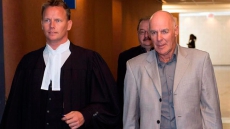OTTAWA — Canada's middle class is the darling of doting politicians everywhere — the focus of a growing list of election promises, the subject of endless speeches, the precious vote-rich prize whose support can make or break a political party in this year's federal election.
The importance of the middle class is not in question. But its membership certainly is. Who belongs to this club anyway?
Politicians and economists often have different definitions of the middle class, a demographic Canadians will hear more and more about as the October election date approaches.
"One of the troubles with the term middle class is it's so elastic and there's not a clear-cut definition," said Charles Beach, an economist and Queen's University professor emeritus.
Beach says surveys have shown most Canadians consider themselves part of the middle class without quite defining what it is.
Therefore, he describes the term "middle class" as a convenient phrase politicians can sculpt any way they like to relate to a large group of the population.
Politicians have recently offered clues on who they believe fits into the middle class, to varying degrees of detail.
Federal Finance Minister Joe Oliver suggested recently that families with kids that have pre-tax, annual incomes of about $120,000 were part of the middle class.
The Opposition New Democrats' definition focuses on the middle 60 per cent of income earners, while the Liberals describe the segment as the largest group of Canadians whose earnings allow for things like decent housing, education and retirement.
Economists feel more comfortable sticking to statistical models, but even those within the research community have different methods of characterizing it.
An internal Finance Department document produced for Oliver shows that differences exist between political and statistical interpretations of the middle class.
The July memorandum, signed by deputy minister Paul Rochon, defines the middle class as a narrow, 20-per-cent slice — or the middle fifth — of all Canadian households.
In its example, the department described middle class as households where members 16 and older took home an average 2010 income between $34,400 and $44,900, after adding government transfers and deducting taxes.
The department, which included its interpretation in a broader document exploring the "economic situation of Canadians in middle-class families," acknowledged the subjective nature of the term.
"There is no consensus definition of 'middle class,' nor is there an official government definition," said the memo, obtained by The Canadian Press under the Access to Information Act.
Major political parties have already made the middle class a focus of their pre-election discourse.
"If you want to fight for the middle class, you do it by putting more of their money back in their pockets," Prime Minister Stephen Harper said at a Jan. 25 campaign-style event in the Ottawa area.
NDP finance critic Nathan Cullen said parties attempt to woo the middle class because so many people think of themselves as part of this demographic — even some of those making more than $250,000 per year.
Cullen doesn't think there's a perfect statistical definition for the middle class, but he says his party focuses its policies on the middle three fifths of income earners — or 60 per cent of Canadians.
Economically speaking, he described the well-being of that segment as a key indicator of the country's economic health.
"That's a critical component of an advanced economy," Cullen said in a recent interview. "If that middle group is not doing well, it's almost impossible for the economy in general to be doing well."
The Liberals were less specific in describing the middle class.
Liberal finance critic Scott Brison said in an email that many experts have differing views on where the middle class starts and ends, particularly when accounting for the regional cost of living and family size.
Without setting statistical parameters, Brison defined the demographic recently as "the broadest swath of Canadians whose working income gives them the capacity to provide decent housing, quality of life, and a good education for their families, while saving for a dignified retirement."
Kevin Milligan, an economics professor at the University of British Columbia, says economists prefer to leave middle-class descriptions to people in other fields.
"That's very much a sociology concept that I'm not comfortable defining," said Milligan, who has been an occasional adviser to the Liberal Party on economic policy.
"I tend to prefer to look at numbers and I define things in those ways .... I'm happy to talk about what happens in the middle of the income distribution or the median or the middle quintile."
The median income of a given group is identified by lining up all the individual income numbers and selecting the figure in the middle.
One method of defining the middle class from a median income is by setting parameters that encompass all incomes between 75 and 150 per cent of the median number.
The Finance Department document also crunched the numbers this way using the 2010 income data. In this example, it identified "middle class" as 47 per cent of Canadians.
The department says the range included households where members 16 and older took home an average income between $24,800 and $49,600, after adding government transfers and deducting taxes.
And the health of the middle class?
The Finance document says "controlling for the changing composition of Canadian families and accounting for the impact of taxes and transfers, the income of middle-class Canadians has increased by 31 per cent in real terms since 1976."
Looking at recent figures, here are some other potential statistical definitions of the middle class.
— The middle 60 per cent of families earned an average of $53,500 after tax in 2011, according to numbers posted on the website for Employment and Social Development Canada.
— The total median 2012 income for families, defined in this case as all couples with or without kids, was $81,980, according to Statistics Canada.
But as political campaigns have shown, the malleable definition of middle class reaches beyond the numbers.
"Politicians can use it however they like," Beach said.




